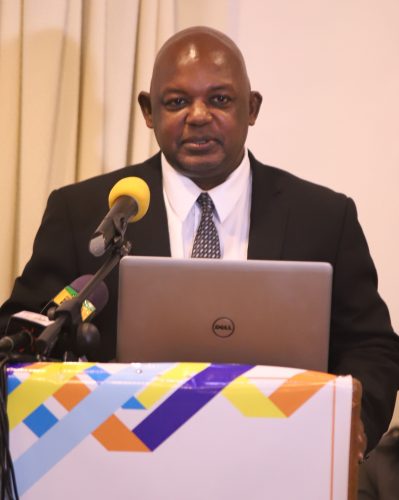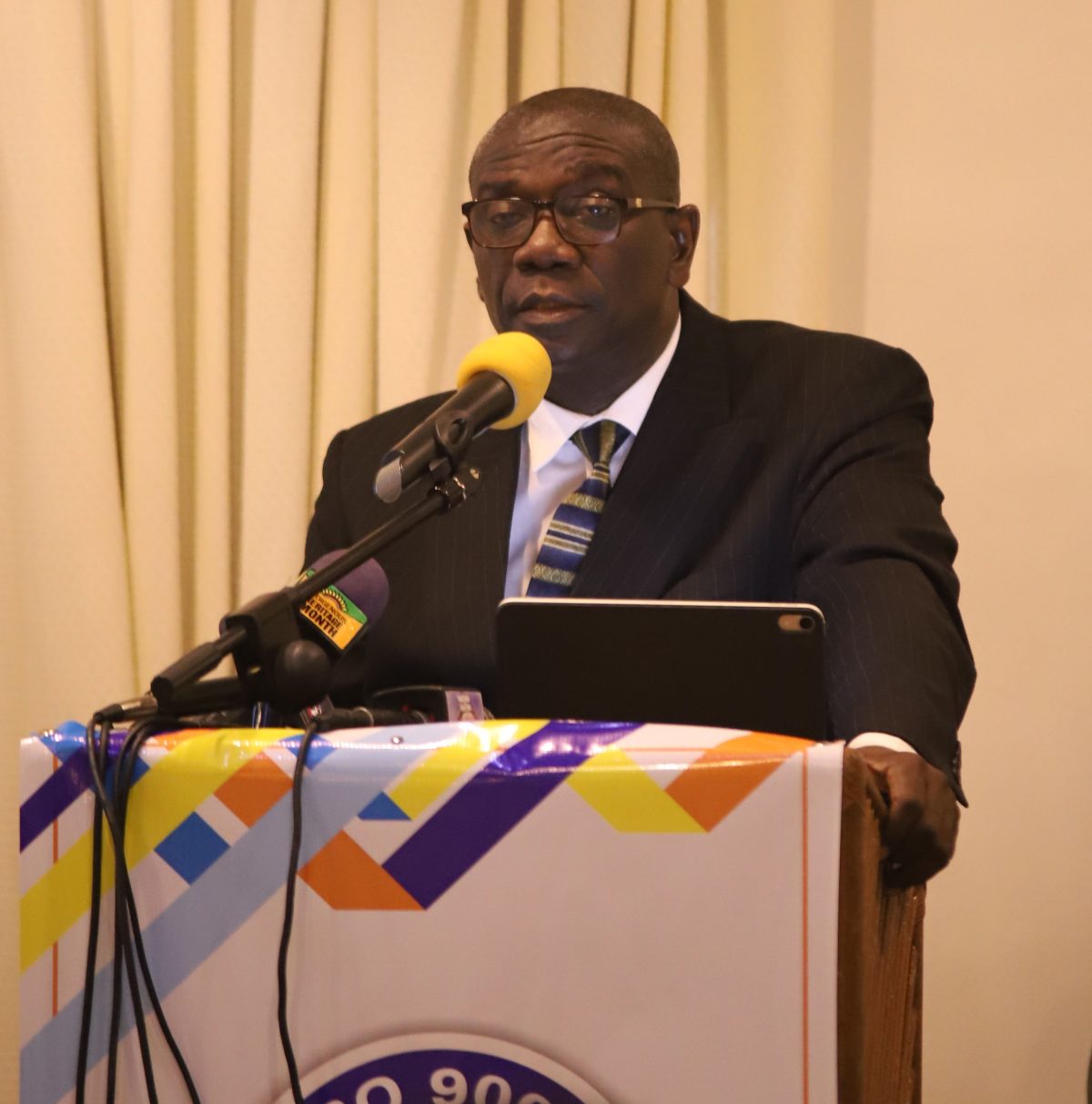From June 1st to August 31st, Guyanese customers experienced power outages an alarming eight times per day on average, according to statistics produced by electricity utility, the Guyana Power and Light (GPL) company, at a stakeholders’ forum yesterday.
“I wish to acknowledge that GPL’s management is not proud of the situation in which its customers find themselves,” Chairman of the utility’s board Rawle Lucas said, even as he once unintentionally called the company “GP Hell” – a moniker long bestowed on the utility by dissatisfied customers – much to the consternation of other GPL executives.
At the meeting, held at the Herdmanston Lodge, Georgetown, officials told attendees that while GPL is not proud of its performance, much of its shortfalls had to do with the lack of capacity and redundancy issues. Promises were made that the utility is working to implement systems that would lesser power outages in the next few months.

Shocking statistics on power outages were presented by Lucas, who said that GPL’s management has reported that there were 772 power outages of varying duration from June 1st to August 31st, 2019.
“Over a 92-day period, that amounts to an outage occurring eight times per day. The data reveals that our customers from Charlestown to Timehri have been suffering the most. They have experienced 32 per cent of the reported outages of that period. The customers on the East Coast have suffered 23 per cent of the outages while the customers in the West Demerara area have suffered 21 per cent of the outages. The GPL customers in Berbice experienced 17 per cent of the outages,” Lucas revealed.
“Reporting this information is not comforting since the inconveniences remain as we speak. GPL reported last week that 23 megawatts (MW) of power were unavailable. While most of that will return over the weekend, the need to perform scheduled maintenance on one of the larger generating plants in Kingston will result in the continued unavailability of at least 7.8 MW of power for a further period of time,” he added.
The board chairman said that they were reminded or informed about “three things from GPL’s management that were influencing the power outages.” From tours of GPL”s facilities, he said, board members also learnt about some contributing factors first-hand from staff members they met.
One reason for the power outages experienced, Lucas said, was because the 69 KV cable that brings power from Vreed-en-Hoop to Kingston was severed and the repairs are still to be completed. That event, he said, has left the Demerara-Berbice Interconnected System (DBIS) short of power. GPL later learned that at the time it was commissioned, the cable was never buried to a depth that guaranteed its protection from river traffic.
It is to this end that the utility’s management has recommended to the board, which granted its approval, that the cable, once repaired, must be buried properly to protect it from river traffic. “GPL has begun making preparations for that action by completing consultations with [the Maritime Administration Department] within the last three months on the chart depth to which the cable should be buried once the repairs are completed. Work on that activity has already started,” Lucas said.
He further revealed that nearly half of the outages, some 45 per cent, were caused by either an earth fault or a generator trip, while an additional 20 per cent of the outages stemmed from network switching or over current. “The network switching and over current causes relate to the loss of generation capacity and the inability of the network to respond adequately to load changes. In order to protect the entire network from going down, the system dumps some of the load, hence the reason some areas get blackout and others remain lighted,” he said.
The board has asked GPL’s management to put forward, with urgency, a plan to make its preventive maintenance more effective, he disclosed.
Regarding the issue of the lack of redundancy in the system, Lucas said that it is in all three phases of GPL’s service – generation, transmission and distribution. “This means, therefore, if GPL has to take a line down for maintenance, then people will lose electricity. At the moment, GPL is unable to switch service to an alternative line to get current to consumers when a line goes down for any reason,” he explained.
“However, I am pleased to report that following the incident with the cable in June and out of a serious concern for the welfare of its customers, GPL embarked on the installation of an alternative line to transport power from Vreed-en-Hoop to Vriesland on the West Bank of the Demerara River. That action has reduced the low voltage problem that the area faced and has halted the blackouts in the West Demerara area. GPL intends to install an alternative transmission line from Kingston to Sophia which would also eliminate the need for power outages,” Lucas added, even as he assured that work is being done to address the concerns that customers and other stakeholders have about the capability of the utility.
It was stated that the overhauling of the system to allow for a consistent and reliable power supply could take about three to five years. However, assurances were made that systems that would lessen power outages in the next few months are being implemented.
In this vein, GPL’s Chief Executive Officer (CEO) Albert Gordon yesterday said that customers should expect another blackout free December, as the company moves from strength to strength into 2020 and beyond.
“We are hoping, as there was zero outages last Christ-mas, the same this year and beyond. We recognise the importance of that and we are pushing for that. We don’t want to go backwards and we want to make every day like that is possible,” Gordon said.
“Yes, we are trying our best to have the same as last year, we are moving, we are moving,” he added.
‘IPP’
For Gordon, finding a solution swiftly is a top priority for the power company even if it means foregoing the long wait and bureaucracy on multilateral loans and opting for supply from independent power producers (IPPs).
“That is what we are weighing. Can we wait on this low-cost financing or should we go for IPP? We are proposing that given the timeframe, we are proposing that we go for IPP rather than wait,” he said.
And even as it has already committed to an agreement to purchase power from Giftland, the company will have to wait until after October 6th for regulatory and procedural timelines to be followed before it can sign that agreement. This is because GPL faces legal and regulatory restraints which have to be addressed before it could purchase Giftland’s excess power.
Guyana’s laws does not allow GPL to purchase power from private producers unless it is from a renewable source and the producer is generating more than 10MW. “The law says that everybody have to get a licence to sell to GPL. What this amendment is doing is removing that for persons who have less than 10MW to sell. A simple example: If you have solar on your roof, you can try to tie in with the grid to use whatever unusable portion. The minister has to put out an order to remove that. I wrote him asking him to put out that order and Cabinet has approved that order and [that] will pave the way,” Lucas said.
Before the amendment can take effect, there is a 30 days period to notify people of it. Once that period passes without any serious objections, the way is cleared for the purchase. The minister has to then issue an order that allows that to happen.
A notice for that amendment was issued in last Sunday’s newspapers, according to Lucas.
“Now the legislative or regulatory changes; that is, changes to licence, those will facilitate us going [to an] IPP that are not renewable that is. Previously, that same legal constraint would have been a factor of how we go from IPP as well. Once we get that first block in, that is when I can say we could get some comfort. But until then, we will be putting in smaller increments,” Gordon said.
“The agreement is already finalised but in terms of executing, we can’t if the law doesn’t facilitate that. So we have to make sure that we don’t sign an agreement that isn’t consistent with the law. Once we can legally sign, we will begin implementation,” he added.





